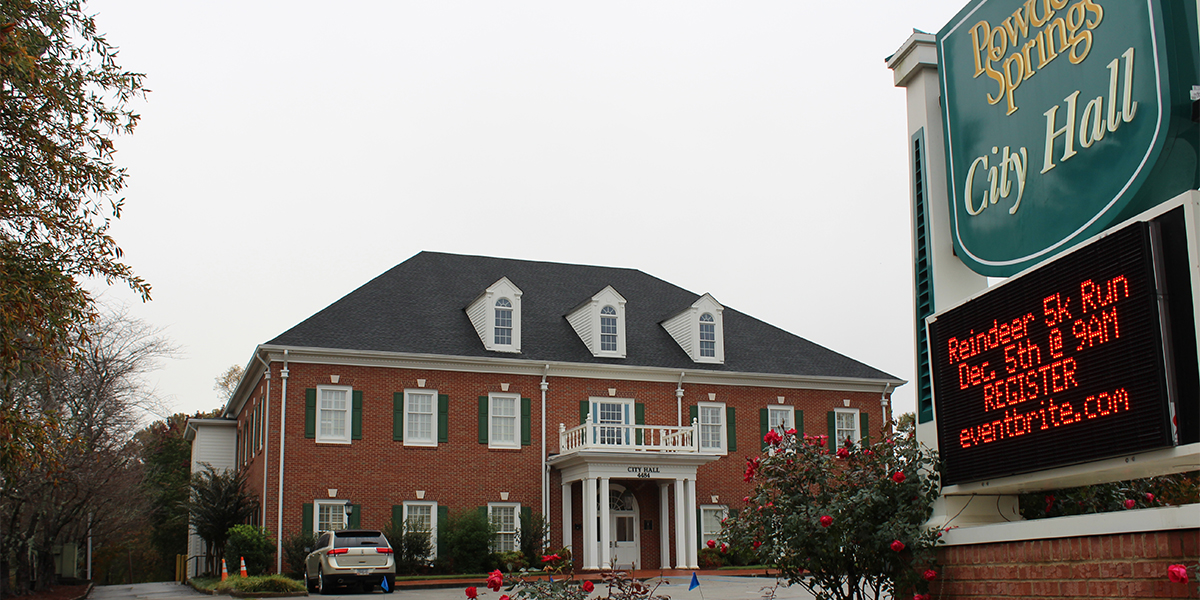Banning Guns Too Costly For Some Georgia Cities

Johnny Kauffman / WABE
It’s been more than a year since Gov. Nathan Deal signed a law broadening gun rights in Georgia.
“House Bill 60,” he said on signing day, “will protect law abiding citizens by expanding the number of places they can carry their guns without penalty.”
Critics call it the “Guns Everywhere Law,” because it gives bar owners and churches the ability to allow guns onto the premises and licensed gun owners to carry weapons into an unsecured government building. The law leaves it up to cities and counties to institute their own weapons bans.
But a year later, some local governments are still struggling to keep weapons out.
Powder Springs
West of Atlanta in Cobb County sits the small town of Powder Springs, Georgia. It’s home to a few thousand, with a downtown that’s about equal parts small businesses, vacant storefronts and government buildings.
City Councilwoman Rosalyn Neal is proud of Powder Springs and its people.
“We have good citizens. They don’t say too much,” she said.
But that’s not always the case.
In Powder Springs, resident Dylan Johnson spooked the City Council recently when he accused them of ignoring complaints about speeding in his neighborhood.
“There’s nothing been done about it. Like I said I got kids, and I got dogs, and if one of them gets hit, or if I get hit, or if my old lady gets hit with my kid in the car backing out of the driveway. I’m going to handle it,” Johnson said at a City Council meeting this summer. “It’s going to get nasty after that.”
Johnson might have just been worked up, and what was meant by “get nasty” isn’t clear. But, he left council members like Neal thinking he might come after them.
“I’m going ‘Oh really, you know.’ I don’t think he would. But this day and time you never know. You really don’t,” she said.
Johnson eventually got what he wanted. The council approved speed bumps for the street, but they’re still struggling to answer the bigger issue his threat brought up.
Complex and Costly Gun Control
Richard Calhoun is an attorney for the city of Powder Springs. He remembers Johnson’s words to the council and the anxiety they created.
“Maybe somebody comes in with a gun with no intention of doing anything wrong, and then during the meeting they get heated up … and causes a scene,” Calhoun said.
However, keeping guns out can be complex and costly.
Calhoun said the gun law means just posting signs won’t prohibit guns. There has to be an armed security guard.
“To restrict access you’ve got to have it screened by security personnel,” he said.
In Powder Springs, that would mean around $15 per hour to pay a police officer, and $20,000 to install four metal detectors. Each building would need its own screening area.
Even though Councilwoman Neal felt threatened at the recent meeting, she said banning weapons would cost too much.
“I think it is being diligent with the taxpayer’s money. I just don’t believe that we need that right now,” she said.
She said she’d prefer just posting signs, like they could have done in the past. That would amount to nothing more than a suggestion that Powder Springs residents don’t bring guns to meetings though.
Jerry Henry is with the gun rights group GeorgiaCarry.org.
He said posting signs would actually create more risk because fewer people would be prepared to defend themselves.
“The only way you’ve got a gun-free zone that actually works is to have guns backing up the gun-free zone,” he said.
For Powder Springs Police Chief John Robison, the metal detectors and extra personnel are worth it to keep weapons out.
“We can’t differentiate between the good and the bad so that’s why it’s probably best that we just say no weapons at all and eliminate that threat hopefully,” he said.
Across Georgia, other small cities with small budgets like Powder Springs are also still grappling with implementing the gun law passed last year. The Georgia Municipal Association, which supports cities around the state, said it gets weekly calls for help and advice.
Meanwhile, Powder Springs is still deciding what to do, and local governments throughout Georgia hope debates over speed bumps and stoplights, remain just that, debates.
9(MDAxODM0MDY4MDEyMTY4NDA3MzI3YjkzMw004))








